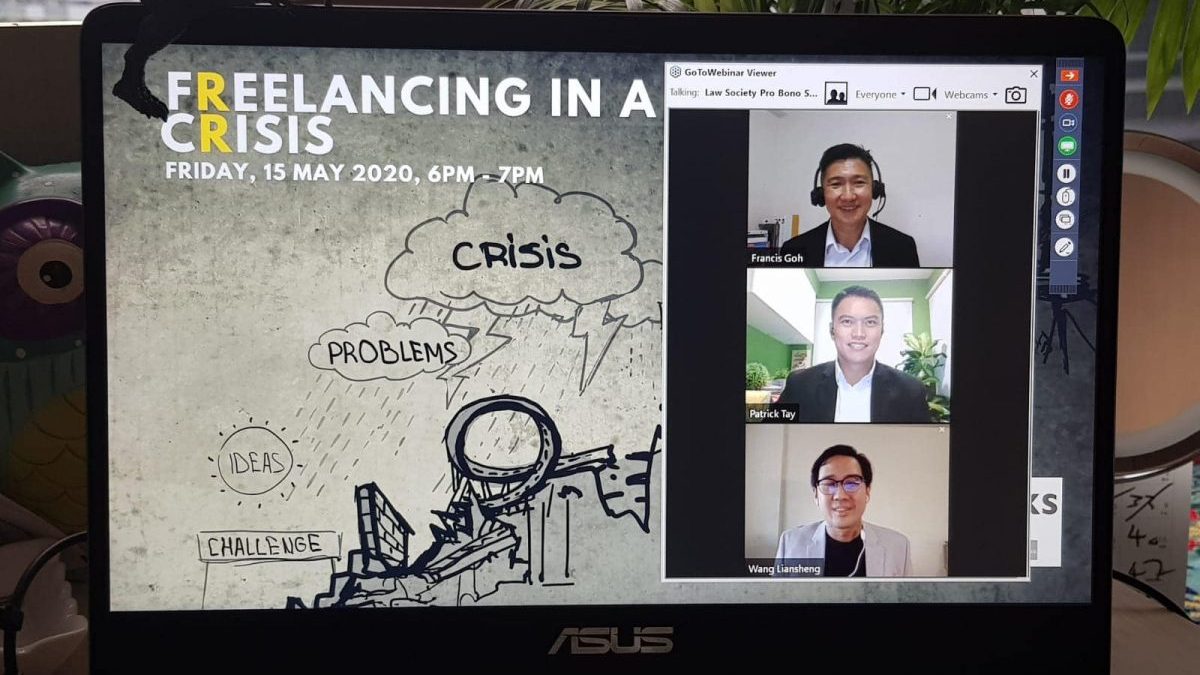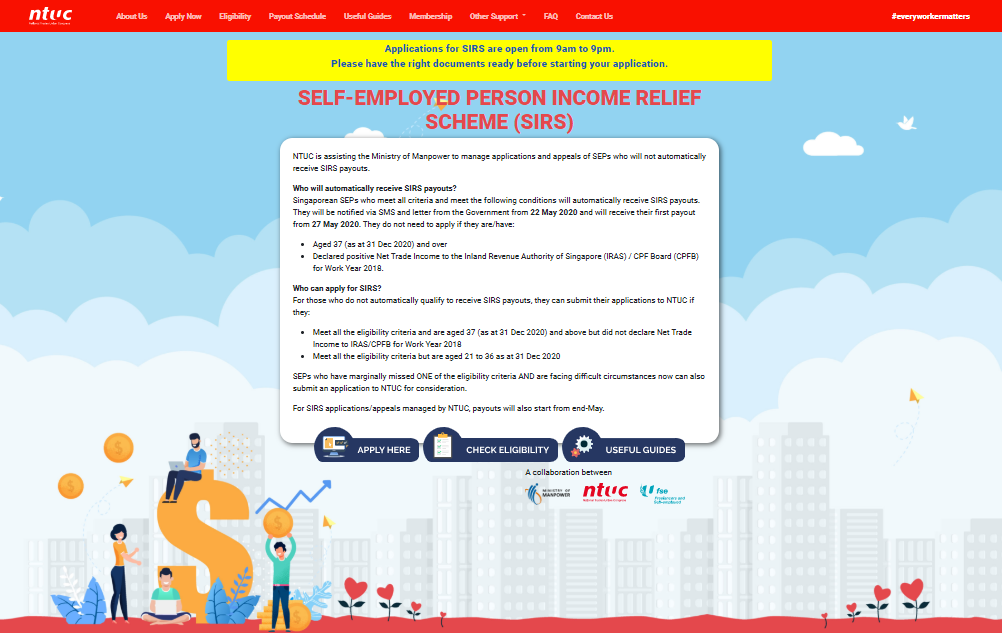This is a contribution piece by NTUC Assistant Secretary-General Patrick Tay. Any extracts should be attributed to the author. 21 May 2020.
Without a doubt, the COVID-19 situation, the ensuing cancellation of events and closure of non-essential services has had significant repercussions on freelancers. Many have reported a sharp decline in assignments and income stream, leaving them financially vulnerable.
Recently, I met with some of these freelancers over the inaugural LawWorks webinar “Freelancing in a Crisis” on 15 May 2020. Jointly organised by the NTUC and the Law Society Pro Bono Services, it was a good platform where everyone could share their concerns, engage in frank discussion on issues and share experiences as well as the available help that is out there. I was heartened that there was excellent feedback on the webinar, with many sharing that it brought light in a season of darkness.

Indeed, these are dark days and extremely challenging times for everyone, particularly for our freelancers and self-employed persons, who may find it especially tough to navigate through these times. For example, many freelance wedding photographers today no longer perform wedding photoshoots. Some private tutors who are forced to conduct lessons virtually have also reported slashes in tuition fees, and others involved in editing sports content have likewise reported fewer opportunities due to the postponement and/or cancellation of such sporting events. Additionally, some private hire car drivers also face difficulties paying rent to vehicle rental companies under their vehicle rental agreements, while other financing companies involved in hire-purchase agreements have purportedly become uncontactable when queried about the effect of the COVID-19 Temporary Measures Act on such agreements. Unfortunately, these are just some of the many challenges which freelancers are facing today. But freelancers, you are not alone.
Knowing Your Legal Rights as a Freelancer
Cancellation of projects and/or events due to COVID-19 – A Force Majeure event?
Some freelancers have reported that several companies have attempted to rely on COVID-19 as a force majeure event, as a basis for cancelling or terminating existing contracts. A common query is whether the COVID-19 is a Force Majeure Event, and if so, what are their rights?
In such a situation, parties will need to refer to their contract for the provision of a “Force Majeure Clause”. A typical “Force Majeure Clause” generally provides for the suspension or release of parties’ contractual obligations upon the occurrence of certain event(s) which are out of parties’ reasonable control, where such events prevent parties from performing their contractual obligations.
Common examples of Force Majeure Events include acts of God, pandemics, terrorism, riots and/or acts of governments. If the clause refers to epidemics or pandemics or is otherwise worded widely enough, it is possible that COVID-19 and the movement restrictions imposed by the Government, could constitute Force Majeure Events justifying the release or suspension of contractual obligations. This pandemic has illustrated the importance of Force Majeure clauses, and in future, contracting parties may wish to consider various scenarios which occurrence is out of the parties’ control, making contractual performance impossible, and include such events within the Force Majeure clauses, to provide for what is to happen upon the occurrence of such events.
In the absence of a Force Majeure Clause, parties may rely on the doctrine of “frustration”, under which both parties are automatically discharged from their contract by operation of law when, without the default of either party, a supervening event occurs rendering their contractual obligation radically different from what was agreed upon. This doctrine is only applied in exceptional circumstances.
Having said that, in the interests of saving time and costs, and preserving business relationships between parties, parties should consider mediation and/or direct negotiations with the aim of arriving at mutually acceptable solutions moving forward, including but not limited to postponing the said events, exploring the possibility of conducting them virtually, or extending additional credits to be used in future.
COVID-19 (Temporary Measures) Act (the “Act”) – How does it affect freelancers?
The COVID-19 (Temporary Measures) Act provides temporary relief for 6 months for parties who are unable to fulfil their contractual obligations, which inability must be caused by the COVID-19 situation. The Act only applies to certain classes of contracts.
For freelancers, the Act may be of relevance as it covers event or tourism-related contracts, entered into before 25 March 2020, with the event and/or tour scheduled to be held on or after 1 February 2020.
Under this Act, the other party will not be allowed to commence legal proceedings for non-performance of the contract, impose cancellation fees and/or automatically forfeit deposits for event- and/or tourism-related contracts. To claim the relief under this Act, the party unable to perform its obligations should first confirm they are eligible for relief, and thereafter, serve a Notification for Relief to the other party. If accepted, the reliefs will apply and the parties to the contract are then prohibited from taking legal action during the period of relief. For more details please refer to: https://www.mlaw.gov.sg/covid19-relief/
The Act may also be applicable for hirers in hire-purchase agreements for commercial vehicles. If the agreement was entered into before 25 March 2020, and the hirers are unable to pay instalments from 1 February 2020 or later, due to COVID-19, the financing companies cannot repossess the vehicle, continue or start court or insolvency proceedings against them during the said relief period.
It is often a painful process to go through the legal route, so where possible, working towards a mutually acceptable solution is always encouraged to cut losses for both parties.

Knowing the schemes available for Freelancers / Self Employed Persons (SEPs)
For many freelancers who have had your livelihoods disrupted and suffered a dip in income this period, I encourage you to apply for the following schemes available:
a. Self-Employed Person Income Relief Scheme (SIRS), under which eligible Singaporean SEPs will receive three quarterly cash payouts of S$3,000 each in May, July and October 2020. For those who do not qualify for auto-inclusion under SIRS, or who marginally missed one of the criteria but are facing difficult circumstances, you can submit an application to NTUC for consideration. Visit www.ntuc.com.sg/SIRS for more information.
b. NTUC Training Fund for SEPs, which aims to help freelancers earn as they train. Through this training fund, SEPs will be paid an allowance, while attending training courses to pick up new skills. The NTUC Training Fund for SEPs is available for NTUC union members and members of the public. Visit bit.ly/ntuctrgfundSEPs for more information.
c. NTUC Care Fund (COVID-19) which provides a one-off cash relief of up to $300 for existing and new NTUC union members experiencing hardship. Visit bit.ly/carefundcovid19 for more information.
For a snapshot of all the assistance schemes available for freelancers, please visit: www.labourbeat.org/SEP. For NTUC union members, you may also write to lawworks@ntuc.org.sg for an appointment at our monthly legal clinics if you require further legal advice.
Never too late to learn new skills and multi-skill
Perhaps, the pandemic, is also an opportunity for freelancers and self-employed to look for alternatives. For example, tutors who have had to shift to conducting virtual lessons would need to leverage new technology and platforms, master a virtual classroom set-up and pick up new skills in terms of conducting virtual classroom teaching. Likewise, I’ve also heard of freelance photographers who have taken to virtual photography – which not only has given breadth to the photographers’ creative expression, but also demands proficiency in terms of a different set-up, lighting, down to the creative direction and interaction between photographer and subject.
While COVID-19 has brought about with it a new normal and with it, its own set of challenges, it has also brought about opportunities. With the assistance that Government has rolled out, there must be greater impetus for all to take advantage of these schemes and support, to deepen your skills, learn new skills and even multi-skill. Ultimately, this will go a long way in ensuring that we stay ready and relevant – during the COVID season and even beyond.
Conclusion
For private hire drivers, we know that the sudden decline in commuting by the public has resulted in reduced income, and many of you have difficulties paying rent under your rental agreements with the vehicle rental companies. We have conveyed your concerns to the Ministry of Law and will lobby for the widening of the Act to cover such agreements.
For all other freelancers, we know that it is not easy as individuals weathering this storm. Nevertheless, there is strength in numbers. You have our commitment – that we have your interests at heart and will be lobbying to organise and unionise freelancers in the near future, for greater assistance, support and protection, because every worker matters.

